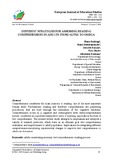| dc.contributor.author | Sofologi, Maria | |
| dc.contributor.author | Efstratopoulou, Maria | |
| dc.contributor.author | Kamari, Afroditi | |
| dc.contributor.author | Bonti, Eleni | |
| dc.contributor.author | Katsiana, Aikaterini | |
| dc.date.accessioned | 2022-01-19T08:15:06Z | |
| dc.date.available | 2022-01-19T08:15:06Z | |
| dc.date.issued | 2020 | |
| dc.identifier.issn | 25011111 | |
| dc.identifier.uri | http://hdl.handle.net/11728/12106 | |
| dc.description.abstract | Comprehension constitutes the main purpose of reading, one of the most important
human skills. Furthermore, reading and therefore comprehension are perplexing
procedures, that are built through the interaction of the cognitive functions.
Comprehension occurs in a cognitive and metacognitve level. Meta-comprehension
indeed, constitutes an important interpretive factor of learning, especially in the field of
text comprehension. The present review study attempts to emphasizes and interpret a
variety of research protocols, which have as an ultimate goal text comprehension
evaluation and improvement in adult population. Implications for integrating different
comprehension-monitoring experimental designs to improve text comprehension in
adults are discussed. | en_UK |
| dc.language.iso | en | en_UK |
| dc.relation.ispartofseries | European Journal of Education Studies;vol.7, issue 4 | |
| dc.rights | © The Author(s). | en_UK |
| dc.rights.uri | http://creativecommons.org/licenses/by-nc-nd/4.0/ | en_UK |
| dc.subject | adults | en_UK |
| dc.subject | monitoring accuracy | en_UK |
| dc.subject | text comprehension | en_UK |
| dc.subject | reading process | en_UK |
| dc.title | Different strategies for assessing reading comprehension in adults. From alpha to omega | en_UK |
| dc.type | Article | en_UK |
| dc.doi | 10.5281/zenodo.3762660 | en_UK |


